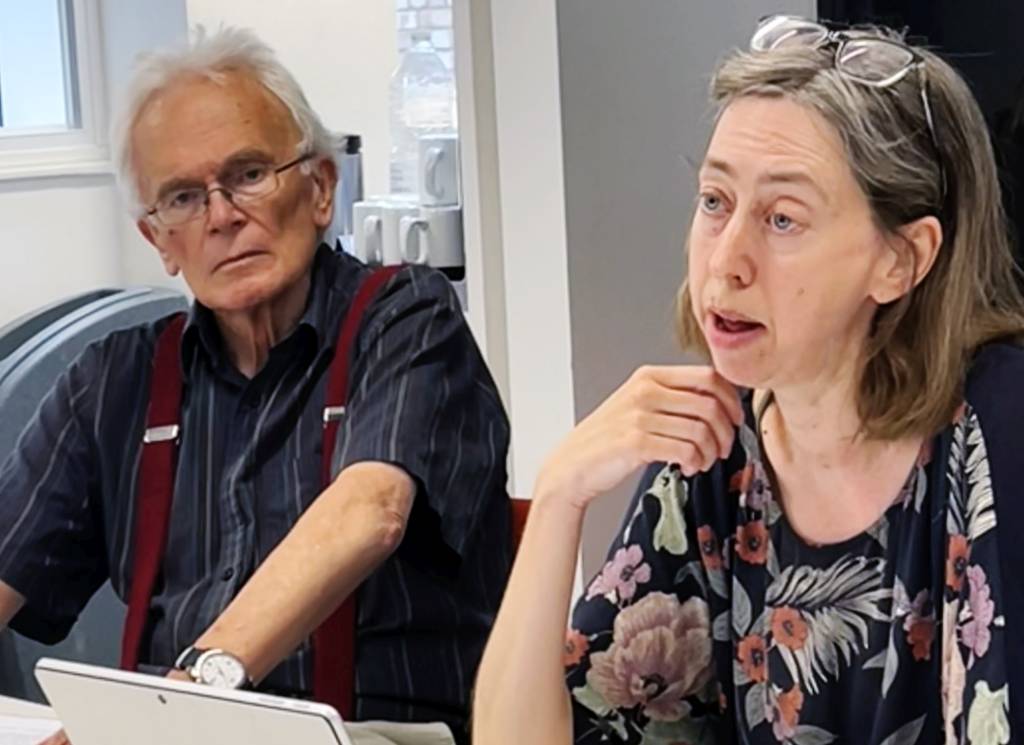General Secretary Laura Davison’s key points for freelances
AT THE JULY Branch Meeting we heard from our relatively new General Secretary, Laura Davison. Laura outlined how the NUJ as a member-led union works through the mandates and motions debated at delegate meetings that instruct the NEC and the leadership how to confront the challenges to the media industry for NUJ members. Below are the key issues Laura raised.

Branch Treasurer Phil Sutcliffe (left) with Laura Davison at the July Branch meeting
1The NEC will organise an event marking the deaths of journalists, linked to the International Day to End Impunity for Crimes Against Journalists which is a UN recognised International Day, observed annually on the 2nd of November to spotlight the persistently high level of impunity for crimes committed against journalists worldwide. Laura said that currently the NEC’s proposal is to hold an online event, to maximize participation and accessibility.”
2The NUJ safety tracker is “a tool for journalists to log on and to record on and offline threats and incidents impacting their safety to help the union to build up a body of evidence we can use in our discussions with government bodies and other organisations to highlighting. the collective consequences for our members. The Safety Tracker is also available to non-members to, allow us to gather more data for us to be able to raise these issues collectively.
“The tool also enables journalists to report incidents of SLAPS, (strategic litigation against public participation): legal threats which have a chilling effect on journalists' ability to carry out their work.”
3On “artificial intelligence: “we are working on a range of motions came out of the delegate meeting addressing training, guidance, and examples of good practice from elsewhere since the delegate meeting, we have held a webinar for reps on collective organising on AI in the workplace. We had representatives from the TUC come to speak and sister unions from the States, talking about their workplace agreements in relation to AI.
“We've done a huge amount of work early this year on the AI and copyright consultation that the government launched, highlighting the significant impacts on our members in relation to the decisions that the government has been taking on these issues.
“We became part of the Creative Rights in AI Coalition, so we could press that work further. There were a series of amendments that were tabled to the legislation going through Parliament on the data use and access bill. These were ultimately unsuccessful, but the work done around that was significant in raising awareness of these issues and was a high-profile campaign. As a result, the government announced that they would hold a series of expert working groups where they could look further at these issues.
“The union wrote to say that we wanted to participate in that process, and so did the coalition group, so we hope through one of these channels, we will have our voices heard. Breaking news: you're probably hearing this first- the NEC has been invited to participate in those working groups, which will start to take place over the next few weeks.”
4The merger of Getty and Shutterstock “is impacting our freelance photographer members. We have been invited by the Competition and Markets Authority to put in a submission in relation to that merger and our concerns around the impact it will have, for example, on fees, and the range of outlets available to our photographers to submit work to. We also met the Chief Executive of Getty, at the time this was announced, and sought assurances about their use of AI, as part of that discussion.”
5Rates for freelancers “have stagnated and fallen behind, catastrophically and we must focus on how we can improve those by linking in with our organized chapels where we have freelancers, but where we don't have that collective voice in the same way. We have had examples where we have been able to move rates upwards through collective pay negotiations in our recognised chapels but we need to see what we can do to spread that good work out and engage more proactively in those discussions.”
6The NUJ “is holding a get-together for branch representatives in the autumn, where we want to hear from different branches about the successes in your organising, - what works well for you, what doesn't work so well, and share experiences across different branches.”
7The NUJ “invites you to contribute in terms of your recruitment and organising work when you're trying to bring other members into the union: what you find effective, what are the challenges so we can share that knowledge and put together a strategy to share across the union in a formalized way, so everybody is clear on the approach we will collectively take.”
8The government “has been working on its industrial strategy and has shared where its priority subjects are for training and journalistic training is not, going to be in the Government’s priority category this autumn. Universities have been advised to downgrade journalism courses, and the union has joined the campaign led by the NCTJ to encourage the government to rethink, because the issues of trust in journalism and the fundamental importance of journalism for democracy can't be overstated. It's important we're encouraging the next generation of young people to come through as journalists in all its different forms.”
The NUJ is working on a tool “that allows you to write to your MP to highlight these issues and to encourage the government to think again. So, again, if I can just use the opportunity to highlight to you all, and ask that you take part in that campaign, to persuade the government to change their mind.” [The tool was launched on 27 June.]
![[Freelance]](../gif/fl3H.png)
 Save Quality Journalism Education
Save Quality Journalism Education